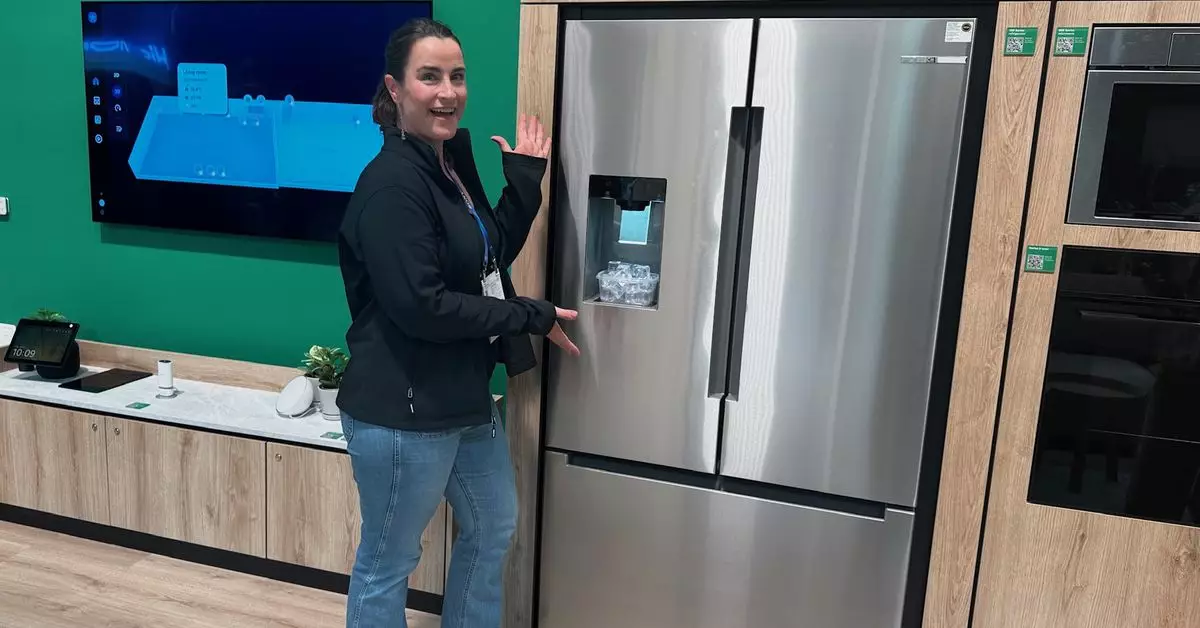The landscape of smart home technology is rapidly evolving, and consumers are poised to benefit greatly from innovations designed to enhance usability, efficiency, and connectivity. As businesses strive to differentiate themselves in this growing market, Bosch, a recognized leader in home appliances, has made a significant leap with its recently unveiled Matter-enabled 100 Series French Door Bottom Mount Refrigerator. This trend is indicative of a broader movement towards integrated smart home ecosystems that promise seamless communication across devices.
Unveiled at CES, the Bosch 100 Series French Door Refrigerator marks the company’s entry into the burgeoning realm of Matter-enabled appliances. Launched in November, it is set to become available in the U.S. this spring at a price point of approximately $2,500. The refrigerator is equipped with a chip that allows it to integrate with the Matter standard, which aims to unify the numerous protocols currently competing in the smart home space. This integration is not merely a marketing gimmick; it signifies a meaningful advance in appliance performance and user accessibility, where consumers can expect an enhanced interaction with their home technology.
Setting the Standard: What Does Matter Bring to the Table?
At its core, Matter is designed to create a reliable and coherent framework for smart devices to communicate locally without dependence on cloud technology. This new standard, developed by tech giants such as Apple, Amazon, Google, and Samsung, prioritizes security, ease of use, and compatibility. The inclusion of a local connection minimizes latency in communication, thereby enabling functionalities like remote temperature management and notification alerts regarding appliance status. For instance, users can receive alerts when the refrigerator door is ajar, preventing food spoilage—a feature that currently requires prior integration with platforms like Samsung SmartThings and Home Assistant.
Moreover, Matter 1.3 supports energy reporting and management, effectively allowing consumers to integrate the refrigerator into a complete home energy management system. This is a leap forward in making energy consumption visible and actionable, giving users not only control but also insights into their energy habits.
A Broader Strategy for Interoperability
Bosch’s strategy goes beyond just the 100 Series refrigerator. In discussions with Eelco Lammertink of BSH, the parent company of Bosch, it was revealed that the plan is to extend Matter’s compatibility across all Bosch, Siemens, and Thermador appliances over the next few years. Each year, the company aims to bring an additional category of appliances into the fold, reflecting proactive product development that prioritizes user connectivity. While this ambitious rollout excludes older appliance models from receiving firmware updates due to technical constraints, it does lay the groundwork for a cohesive, smart-enabled household.
Even as Bosch makes strides with its Matter-compatible offerings, it faces a competitive landscape populated with numerous brands eager to innovate. The challenge lies in maintaining reliability while delivering cutting-edge features. For instance, the claim that existing appliances won’t be updated to support Matter raises eyebrows among loyal customers who invested in premium models like Thermador ranges and dishwashers. As Lammertink put it, “The challenges are too big. We just can’t risk bricking your fridge.”
The future beckons for a seamless inter-device experience, yet Bosch must carefully navigate customer expectations between what is currently available and what is promised in future releases.
The Path Forward
As we look toward a future dominated by smart capabilities, Bosch’s initiative is just a snapshot of a larger ambition within the appliance industry to foster interoperability. With Matter’s potential to serve as the connective tissue between various devices and platforms, consumers can expect a more unified and simplified experience in their daily routines. The evolving landscape of connected appliances will likely redefine our interactions with technology in the home, making the concept of a smart home more accessible and practical for everyday users.
Ultimately, Bosch’s foray into Matter-enabled appliances stands not just as an isolated product launch, but as a testament to the transformational possibilities that lie ahead for smart home technology. The journey is just beginning, and with each innovation, the prospect of a truly smart home becomes ever more tangible.


Leave a Reply